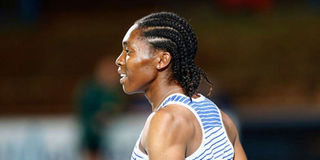Sexual orientation should not curtail women’s freedom to embrace sport

Caster Semenya competes in the women's 200m final during the Athletics Gauteng North Championships at the LC de Villiers Athletics Stadium in Pretoria on March 13, 2020.
What you need to know:
- While general attitudes toward homosexuality have improved over the past three decades, the lesbian label still exists within local sports teams and it only serves to maintain sport’s patriarchal, heterosexist norms.
- Women of all sexual orientations should be allowed to express themselves and to play whichever game they wish.
Today I stand in solidarity with trans women across the world who were gravely disappointed by news that they will not be permitted to play elite women’s rugby.
In case you missed it, the World Rugby Union announced last Friday that trans women will not be permitted to play elite women’s rugby for the foreseeable future because of “significant” safety concerns.
But the Rugby Football Union quickly stepped in with a rejoinder stating that transgender women will still be allowed to play women’s rugby at all domestic levels of the game in England, since more evidence was needed before implementing any ban.
The women athletes in England have a reprieve for now, but this is not the first time an international sports body has cast aspersions on trans women in the game, and it doesn’t promise to be the last.
Back home, things are not so different. In nearly all women’s sports teams, there exists a lesbian stigma that contributes to disparities within those team.
These biases often go undocumented. In fact, many female athletes manage their gender and sexual identities to evade prejudice and discrimination related to this stigma, and it is important to address it.
In February 2013, local sports news website Michezo Africa published a special investigation titled ‘shocking revelation of lesbianism in Kenyan women sports teams.’
According to a survey done by michezoafrika.com over the last two weeks, this is a common sexual orientation across all women teams in Kenya. In that expose that is now seven years old, none of those interviewed agreed to speak on record. That is where we still are: At a place where female athletes are unable to freely talk about their gender orientation for fear of being looked down upon, struck off the team list or abused.
It doesn’t help that most female athletes fit the description of the stereotypical lesbian – thin, flat chested, quick and agile, or strong and forceful, and has short hair. They thrive on aggressive play and have their own legion of viewers in girlfriend and friends who cheer them on.
No local female athlete has ever publicly expressed or spoken about her sexual orientation, and this can only mean that we are not doing enough to push back against the stereotypes.
While general attitudes toward homosexuality have improved over the past three decades, the lesbian label still exists within local sports teams and it only serves to maintain sport’s patriarchal, heterosexist norms.
Women of all sexual orientations should be allowed to express themselves and to play whichever game they wish.





